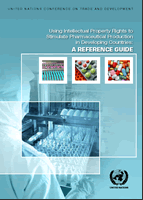
Over the past few years, intellectual property rights (IPRs) have become a major economic,trade and investment issue, as illustrated by considerable increases in royalty payments andlicensing fees in most areas of the world and the inclusion of intellectual property (IP)provisions in regional and bilateral trade and investment agreements.
At the same time, concerns have been raised in many countries as to whether the IP system still serves itsoriginal purpose, i.e. the promotion of innovation and the transfer and dissemination oftechnology to the benefit of society, or whether exclusive rights are increasingly being used todefend selective private interests and prevent effective competition.
This debate has been particularly intense in the context of countries’ public health policies.Patents and the protection of pharmaceutical test data are frequently mentioned in discussionsregarding access to medicines in developing countries.
The United Nations Millennium Development Goals (MDGs) put considerable emphasis on access to medicines. Based on itsexpertise in the interrelated areas of investment, IP and technology transfer, the United Nations Conference on Trade and Development is committed to making its contribution tothis important issue.
The present Guide has been prepared by the UNCTAD secretariat as part of its technical assistance activities in the area of IPRs and thepromotion of pharmaceutical production and supply capacities in developing countries.
These activities respond to a 2005 recommendation by UNCTAD’s Commission on Investment, Technology and Related Financial Issues that:
“UNCTAD should, within its work programme on investment, technology transfer andintellectual property, assess ways in which developing countries can develop theirdomestic productive capability in the supply of essential drugs in cooperation withpharmaceutical companies.”
In the pursuit of this mandate, UNCTAD established in 2006 a pilot programme on localpharmaceutical production and the implementation of regulatory frameworks for access tomedicines with the financial support of Germany and the United Kingdom.
The overall objective of the programme, implemented by the UNCTAD/DIAE Intellectual Property Unit,is to assist developing countries, and least developed countries (LDCs) in particular, to:
- establish domestic intellectual property regimes that facilitate increased access to affordablemedicines; and
- where feasible, create local or regional pharmaceutical production andsupply capacities, with the possibility of cooperative arrangements with investors.
The objective of the present Guide is to provide concise and practical information on ways topromote local pharmaceutical production and improve access to medicines through a varietyof policy tools, focusing on the flexibilities provided under the Agreement on Trade-RelatedAspects of Intellectual Property Rights (TRIPS), and the interfaces between IP, investment,drugs regulation and procurement strategies.
The Guide will be an important tool for trainingactivities for stakeholders from selected developing countries, in an effort to build capacitiesfor the creation of domestic legal frameworks conducive to the promotion of pharmaceuticalproduction and supply capacities.
Supachai Panitchpakdi
Secretary-General of UNCTAD



